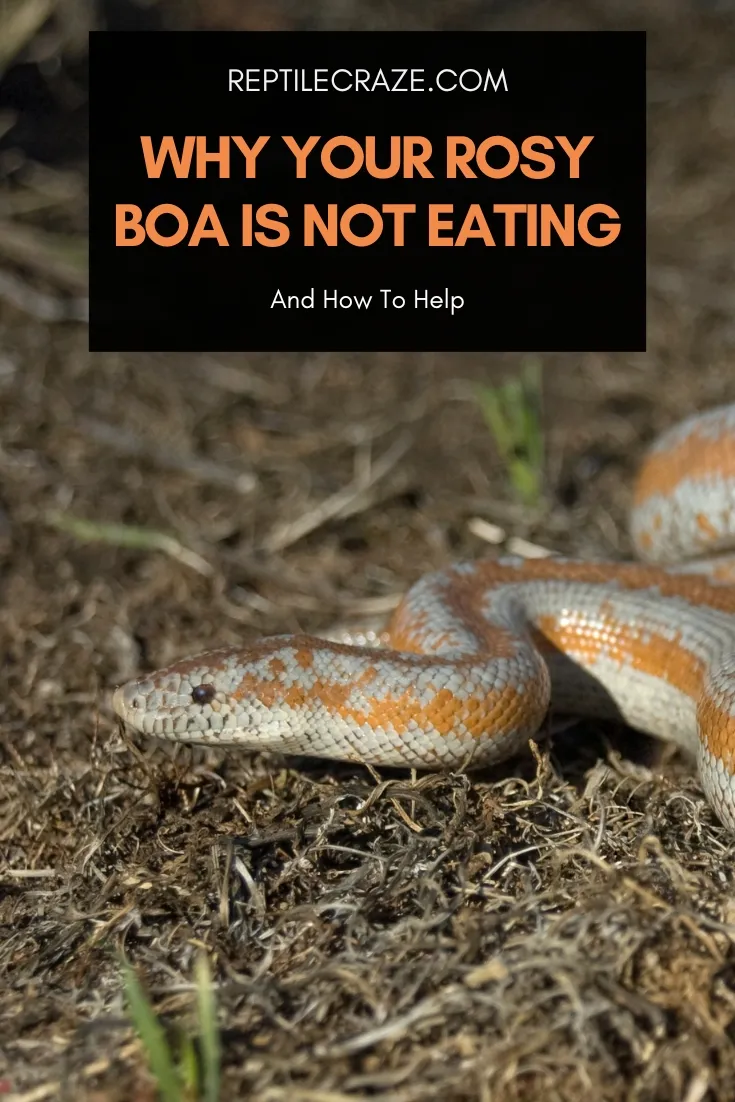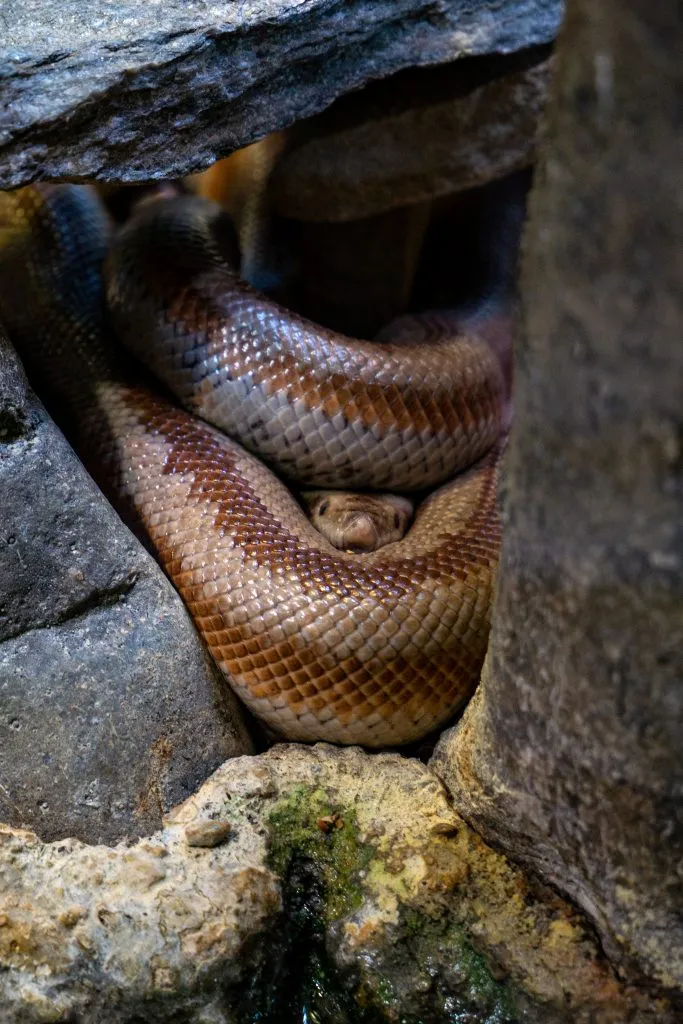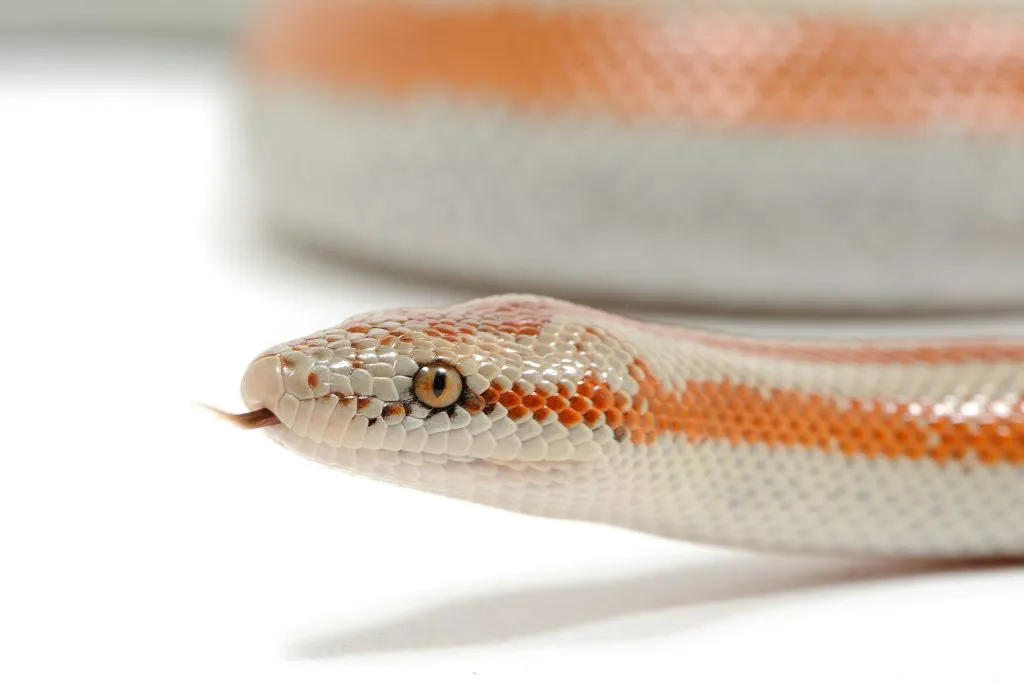
When your boa stops eating suddenly, it can be concerning for any reptile keeper. After all, good health is a priority for all reptiles, and ensuring that your rosy boa eats regularly is an important part of keeping them healthy and happy. But why would your beloved snake suddenly stop eating?
Your rosy boa may refuse to eat because of physiological changes in its environment, enclosure conditions, or a result of stress. Physiological changes may include skin shedding, brumation, and changes in diet as well as changes to their environment, such as low temperature or high humidity. Additionally, medical issues or even a change in the feeding frequency can lead to them refusing
In this article, we’ll explore the possible reasons why your rosy boa may not be eating and provide some useful tips on how to encourage them to eat. So let’s dive in and take a closer look at what could be causing your pet snake’s appetite loss.
Table of Contents
7 Possible Reasons Why Your Rosy Boa Is Not Eating
When it comes to eating, Rosy boas are a breeze—they never pass up their meals and aren’t fussy about whether they’re dining on live or pre-killed animals such as mice.
However, if your boa is a baby, juvenile or subadult and they refuse to eat, it indicates that something isn’t quite right.
Therefore, we are sure with this list in hand – you can quickly identify why your beloved boa may be refusing to eat.
1. Stress
Refusal to eat can be a tell-tale sign that your snake is experiencing stress.
Such anxieties are quite regular for rosy boas since they tend to be timid creatures who require safe environments in order to feed. Stress can be of different types, such as
Relocation Stress
Has your newly-arrived rosy boa stopped eating? If so, they may be exhibiting signs of relocation stress – a common occurrence when transitioning to their new home.
This can happen even if you just brought them in from the breeder, expo, or pet store.
In this case, it’s best to exercise patience and wait at least one week before offering
If they still don’t show interest in eating after seven days have passed, you can try presenting the meal once more – but take care not to overfeed them!
Handling Stress

It’s common for new snake owners to over-handle their rosy boa, leading to distress and triggering a fear response. All this excessive handling can be a stressful experience for your pet, which may lead to them refusing the
If you notice your rosy boa is struggling with handling stress, provide it some time to rest and relax for at least a week.
Miscellaneous Changes
If you’ve had your snake for a while, pay attention to small changes that may have occurred in its environment. Such as,
- Did you move the terrarium?
- Is there different lighting or temperature now?
- Was another pet added to the household recently?
These unfamiliar surroundings can cause anxiety and distress, so it’s important to make sure everything is familiar if any of these things change.
Choose a rarely used room for the enclosure, and ensure that furry family members, including cats or dogs, cannot access it.
2. Enclosure Condition
Being cold-blooded like all reptiles, Rosy boas rely heavily on their habitat to ensure optimal health.
In order to successfully eat and process
Low Temperature
Low temperatures in your snake’s enclosure (anything below 65F), can lead to lethargy and digestive problems, so you must maintain a comfortable temperature of 65-75°F (18.3 C – 23.8 C) on the cool side.
(Temperatures on the warm side should be correct as well, of course.)
After all, if the environment isn’t warm enough for them to properly digest their
High Temperature
On the other hand, if your rosy boa’s habitat is too hot or doesn’t have any temperature variation, it can be mentally stressful for your snake as it cannot regulate its internal body heat.
As a result, you may find them not having an appetite at all.
Humidity

High or low humidity levels can cause serious health complications for your snake and even diminish its appetite.
Make sure to provide a suitable habitat by combining aspen shavings with damp paper towels on the bottom of its
To guarantee that you create a suitable atmosphere for your pet snake, research and explore what the ideal ambient and basking temperatures and humidity fit specifically to them.
Using a digital thermometer and hygrometer when monitoring air temperatures and humidity is imperative, as gauge-type instruments may not provide accurate results.
3. Skin Shedding
When your rosy boa’s scales begin to appear dull and its eyes become creamy-looking, it is likely a sign that they are about to shed its skin—which can cause them to refuse
Don’t worry: this is an entirely natural process! Just make sure you give them some space for the next few days (apart from misting and changing water) while they go through this process.
4. Brumation
If your rosy boa’s temperature drops dramatically, it may be signaling that they are getting ready to go into brumation – the hibernation-like state in captivity.
This is a natural activity among snakes, so if you see this happening, rest assured that nothing is wrong!
So, refusal to eat can be a signal that your snake is beginning brumation, but even if it isn’t, there may still be periods where they simply don’t feel like eating.
For instance, Rosy Boas have the remarkable ability to be able to go up to three or four months without
5. Change in Diet
It is common thing that snakes tend to prefer consistency in their routines and dislike unexpected changes.
If you’ve recently transitioned your rosy boa from a diet of live prey to frozen and thawed
After all, previous habits die hard – if your pet has become accustomed to eating live meals, they may not be as interested in anything else!
So, if you’re adopting a rosy boa from either the breeder or previous owner, it’s critical to ensure you get all the details on what they were fed and in which environment they lived.
Rosy boas can be picky eaters, so this is an important consideration when bringing them home.
6. Feeding Frequency
As a new rosy boa owner, it is understandable that you may want to feed your reptilian companion daily.
However, if done too frequently, this will eventually lead to overfeeding and vomiting of the meal while refusing any further sustenance.
Therefore it’s essential that meals are only given on an as-need basis or according to the recommended feeding schedule for them to have a healthy eating pattern.
7. Other Medical Issues
For the overall health of your boa, it’s important to weigh it at least once a week in order to establish its baseline weight.
If you notice that your snake is losing considerable amounts of weight and not eating as much as usual, this could be an indication that there might be something wrong with their well-being, such as illness or disease:
- Respiratory issues
- Bacterial infections in the gut
- Impaction with substrate
- Skin issues
- Other illness
After ruling out potential causes, if your snake is still not eating and appears to be losing weight, it may be time to see a certified reptile veterinarian.
Final Thoughts
Nourishment is essential for your rosy boa’s health, so you must evaluate the environment and diet provided.
Ensure its habitat has appropriate levels of heat and humidity; additionally, be certain to offer
Provided that your snake’s environment is healthy and suitable, yet it still will not eat, you may need to consult a herpetologist or veterinarian to determine any underlying medical issues.
With patience and proper care, most snakes can eventually overcome their lack of appetite – so don’t give up hope!
Have you had experience with your rosy boa not eating? What did you do to help them? Leave us a comment below! We’d love to hear your story.
- Enchi Ball Python: A Unique and Stunning Morph of Python regius - March 27, 2025
- Emerald Tree Monitor: The Enigmatic Green Guardian of the Rainforest - March 26, 2025
- The Egyptian Cobra (Naja haje): A Fascinating Serpent - March 25, 2025
